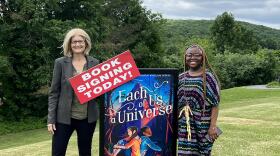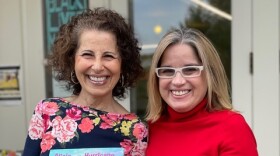Tiffany Jewell is the author of "This Book is Anti-Racist" and — more recently — "The Anti-Racist Kid."
Like many books written about race and identity, Jewell's books have been targeted for restrictions and banning in some libraries. And while she said it's never a positive thing to have a book banned, it does draw attention to what she wrote.
"Folks your age are reading these books because you're like, 'We need to know.' And you're going to read books no matter what. And the adults are fearful, which stinks, but I also have so much like faith in the young folks rising up and doing what y'all need to do," Jewell said. "As soon as you take something away from somebody, they're going to be like, 'Wait, why? And what is this?'"
Jewell was speaking to Kiara Lee, a student at Springfield Honors Academy. Lee interviewed Jewell as part of NEPM's Media Lab program.
Kiara Lee, Media Lab: I've read that you were a educator for nearly two decades and you wanted to write this book for a long time and that this was more of a response to the questions that children asked you during your career, right?
Tiffany Jewell, author: Absolutely. I taught for about two decades, mostly in the Montessori School of Northhampton, working with predominantly 6- to 9-year-olds. And every year we would do work on identity and justice and a lot of work on the history of racism and resistance. And I got lots of questions from kids every year, including my own. I have two kids who are almost 12 and 7.
And the book was just percolating in my head for a long time. And after I wrote "This Book is Anti-racist," which is for teenagers, I was like, well, let's go younger. Because there's no reason why we as older folks should gatekeep information. And so, the book is probably about 50 questions that have all come from kids, like real kids, kids who are now your age and a little older too.
Although you are providing resources for young readers and adults to help them understand what anti-racism is, can you define like your own words? What do you determine anti-racism as?
Yeah, and it's kind of like a definition and something that keeps growing and changing. Because the beautiful thing about being human is we're dynamic and we're constantly growing and changing. And so, for me, anti-racism is really just living in the world, actively resisting racism on a daily basis, whether it's calling out stereotypes (You know, if my kid or somebody I know says something and I'm like, "Whoa, that's based on a stereotype and that's not true. Let's rewind and look at that.") to interrogating my own biases (Like, "Where did this come from?"). And then, also working and really advocating for just policies and laws and procedures and traditions.
A lot of the work I do now is still in schools. And so, working with educators to change the curriculum a little bit so it meets the needs of all the students and not just some of the students. It's really just like that constant action and it looks different for everybody too, which is a really beautiful thing. Because my anti-racism is a little different from your anti-racism and a little different from my husband's anti-racism.
What would you want readers to take away from this book?
I wrote this book for young folks in particular, because when I was young and witnessed and experienced racism at different levels, I knew what it was, but I didn't know how to talk about it. I would go home and tell my mom, "This thing happened today," but I didn't have the language to be like, "That was really unfair and unjust." And so, the book — I wrote it really wanting to share all of the things I've learned with young folks so they don't have to wait until they're adults to be like, "Oh, this is how I need to change things or this actually isn't OK."
My hope is that for young readers, they'll feel more confident in talking and experiencing the world around them. And then for the adult readers, I really want them to trust that kids can do this work, too, and that there's no reason why we as adults should be like, "Yo, you're too young for this." Because you are never too young to be an anti-racist person.






